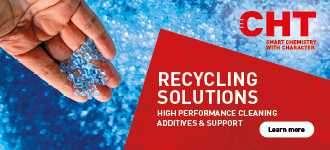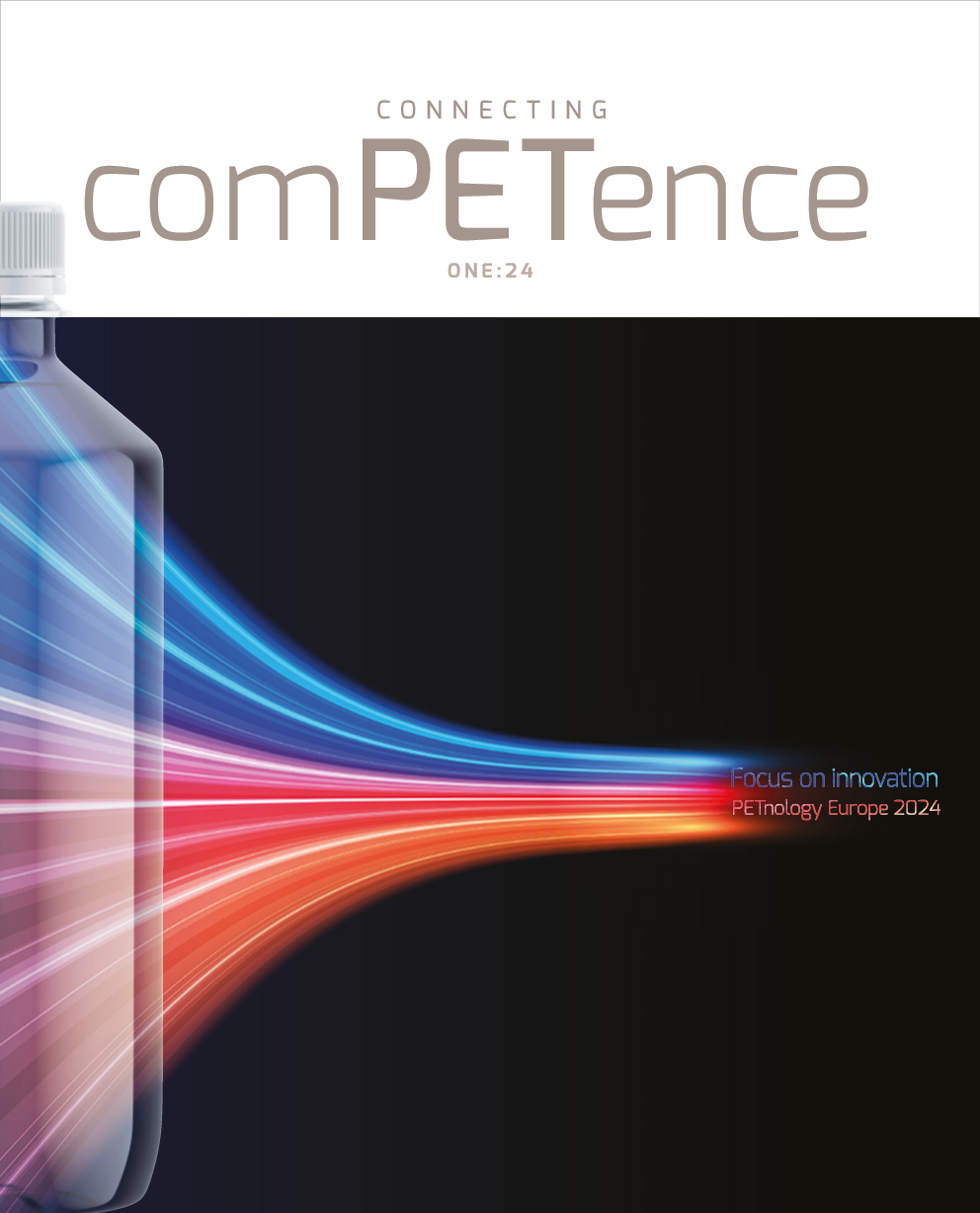Erema (www.erema.at), the Austrian manufacturer of plastic recycling systems, is recording above-average growth rates for its Vacurema® inline sheet technology for the production of flat PET film in a single working step direct from post-consumer bottle flake. The worldwide Vacurema® system capacity installed for this purpose has more than doubled within a mere three years, growing from 65,000 tonnes per year at the end of 2005 to 158,000 tonnes at the end of 2008. In Europe the production capacity even trebled in the same period, rising from 20,000 tonnes (end of 2005) to 60,000 tonnes per year at the end of 2008.

The reasons for this exponential growth lie both in the technological and also the economic benefits of the Vacurema® technology. The Vacurema® Basic system features a vacuum reactor and is used primarily for the production of flat film. This system is highly flexible in terms of feed material and produces rPET in a single step and with particularly low specific energy consumption. International and many country-specific approval certificates document that the product is suitable for direct food contact. The recycling plant can be combined with standard flat film downstream equipment to make a complete single-stage PET sheet production line without difficulty. Erema also offers complete turnkey systems for this purpose. The downstream equipment used comes from Erema's technology partner SML Maschinenbau GmbH, Lenzing, Austria (www.sml.at), which today ranks among the world's top manufacturers of PET film production plants in the field of virgin material.
This inline concept can be used to produce PET flat sheet ranging from 150 ìm to 1.8 mm in thickness. The Vacurema® Basic prepares the flakes and passes on the melt after fine filtration with an Erema RTF automatic backflushing screen changer without the intermediate step of pelletising direct to the SML flat film plant. Its configuration begins with the melt pump and the flat die and includes all subsequent units such as the roll stack section, winding unit, thickness meter and edge trim removal. This plant technology is based on a modular system so it can be planned individually and also meet any special requirements. Moreover, the Erema/SML flat film system requires only one person for operation. If required, ancillary extruders can also be added to make up to a three-layer flat film plant.
Vacurema® Basic – high product quality, extremely low energy consumption
The core components of the Vacurema® Basic system are a vacuum reactor with a directly connected robust single-screw extruder. Washed, amorphous PET flakes, as the starting material, are homogenised in the vacuum reactor, heated solely by frictional heat in the process, crystallised, any moisture adhering to them is removed intensively and – essential for direct food contact – decontaminated at the same time in a highly efficient process. After this pre-treatment the material enters the intake zone of the extruder under high vacuum for the final step to produce high-quality melt. No further degassing openings on the extruder are required. In the case of particularly problematic feed material, however, it is possible to add double degassing to the extruder.
Erema high-performance filters that can be connected directly to the extruder outlet for large-surface, ultra-fine melt filtration, have become extremely popular in the production of flat film. These patented partial surface backflush screen changers feature a fully automatic self-cleaning system which, despite extremely fine filtration (32 µm screen mesh), allows low pressure losses, high filter capacity and long filter service life. Available in a variety of sizes and output levels, up to the six-piston system with twelve parallel filter screens, these Erema screen changers are now also used by other manufacturers for melt filtration on sheet systems.
Compared to multiple-stage processing with separate drier/crystalliser and extrusion plants, the specific overall energy consumption at merely 0.25 to 0.28 kWh/kg of the single-step Vacurema® Basic technology is unrivalled. Furthermore, the IV value (IV: intrinsic viscosity as a measurement for molecular weight) of the rPET can be set so it is above the average: IV loss is – depending on throughput – merely approx. 1% to a maximum 4%, making the feed material virtually loss-free and processed with the lowest production costs. Besides PET flakes, the Vacurema® Basic system can also process ground sheet, ground edge trim and similar items equally well, inlcuding mixtures of them in any ratio.
rPET – on the safe side in contact with food
Common applications for PET flat sheet are food packaging produced through thermoforming such as insert trays for chocolates and confectionary, open and resealable trays and containers for meat, fruit, vegetables and sandwiches and also a variety of cups/cartons, boxes and blister packs. The amount of sheet containing recycled materials – often in the form of a multilayer sheet with rPET in the middle layer – has grown continuously for economic reasons. With regard to 3-layer ABA sheets, however, fears are growing that the virgin material (A) layer may be damaged in the tool during the thermoforming process – a critical situation for contact with food.
This problem does not exist with rPET from the Vacurema® Basic system. Since it was launched in 1998, the Erema process has become established as the most widely used technology worldwide for the bottle-to-bottle recycling of post consumer PET bottle flake. Many country-specific approval certificates and also the internationally recognised certification by the North American FDA document the suitability of the rPET produced in this way for direct food contact.
In Europe, the new regulation (EC) No. 282/2008 of March 2008 stipulates that in future, recycled plastic can be used for food packaging only if it has been produced using an authorised recycling process. The supervisory organisation responsible for this is the European Food Safety Authority (EFSA). rPET sheet produced using the Vacurema® Basic system also fulfils the EFSA criteria in every respect. This has been proven in so-called Challenge Tests, in which the starting material is contaminated with a defined mixture of chemicals prior to the recycling process. In the future this will make it easier for sheet manufacturers to obtain approval for their process if they wish to produce sheet for food packaging made entirely or partially of rPET, because with Vacurema® technology, even sheet made of 100 per cent rPET satisfies the criteria for direct food contact.
Together, all these criteria give the users of Vacurema® technology crucial technological and economic benefits in the production of flat sheet containing rPET – whether it is 100% rPET or mixtures with virgin PET material. This is why the use of the Vacurema® Inline Sheet Technology continues to increase continuously and more or less unhindered even in the current economic crisis. A further 22,000 tonnes of installed annual production capacity has been added in the first quarter of this year alone. Systems for throughputs up to 2,500 kg/h are available and in operation for this purpose.
| Christina Dort Marketing Manager Tel.: +43 (0)732 3190-105 Fax: -6305 ch.dort@erema.at | Werner Hentscholek PR & Communications Manager Tel.: +43 (0)732 3190-306 Fax: -23 w.hentscholek@erema.at |







